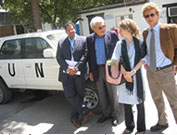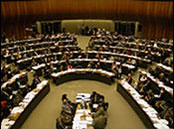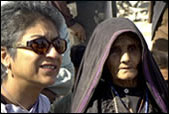What we do
 As the principal United Nations office mandated to promote and protect human rights for all, OHCHR leads global human rights efforts speaks out objectively in the face of human rights violations worldwide. We provide a forum for identifying, highlighting and developing responses to today's human rights challenges, and act as the principal focal point of human rights research, education, public information, and advocacy activities in the United Nations system.
As the principal United Nations office mandated to promote and protect human rights for all, OHCHR leads global human rights efforts speaks out objectively in the face of human rights violations worldwide. We provide a forum for identifying, highlighting and developing responses to today's human rights challenges, and act as the principal focal point of human rights research, education, public information, and advocacy activities in the United Nations system.
Since Governments have the primary responsibility to protect human rights, the High Commissioner for Human Rights (OHCHR) provides assistance to Governments, such as expertise and technical trainings in the areas of administration of justice, legislative reform, and electoral process, to help implement international human rights standards on the ground. We also assist other entities with responsibility to protect human rights to fulfil their obligations and individuals to realize their rights.
Mainstreaming human rights
 Since the establishment of the United Nations in 1945, promoting and encouraging respect for human rights for all without distinction as to race, sex, language, or religion, as stipulated in the United Nations Charter, has been one of the fundamental goals of the organization. We are tasked with mainstreaming human rights within the United Nations, which means injecting a human rights perspective into all United Nations programmes. This is to ensure that peace and security, development, and human rights -- the three essential pillars of the United Nations system -- are interlinked and mutually reinforcing.
Since the establishment of the United Nations in 1945, promoting and encouraging respect for human rights for all without distinction as to race, sex, language, or religion, as stipulated in the United Nations Charter, has been one of the fundamental goals of the organization. We are tasked with mainstreaming human rights within the United Nations, which means injecting a human rights perspective into all United Nations programmes. This is to ensure that peace and security, development, and human rights -- the three essential pillars of the United Nations system -- are interlinked and mutually reinforcing.
This task is essential at a time when the United Nations is undergoing its most far-reaching reform. As we face ever changing challenges in the new millennium, the international community unequivocally puts human rights at centre-stage in addressing various pressing issues worldwide. At the United Nations World Summit in 2005, world leaders reaffirmed the leading role and mandate of OHCHR in responding to the broad range of human rights challenges facing the international community today.
Partnerships
With our leading human rights role and the important task of mainstreaming human rights into the United Nations system, we work with Governments, civil society, national human rights institutions and other United Nations entities and international organizations, such as the International Labour Organization, the Office of the High Commissioner for Refugees, the United Nations Children's Fund, United Nations Educational, Scientific and Cultural Organization, the International Criminal Court, specialized criminal tribunals, such as the ones for former Yugoslavia and for Rwanda, established by the Security Council, and the World Bank in their efforts to promote and protect human rights.
Standard-setting and monitoring

Our method of work focuses on three major dimensions: standard-setting, monitoring, and implementation on the ground. We work to offer the best expertise, and substantive and secretariat support to the different United Nations human rights bodies as they discharge their standard-setting and monitoring duties. OHCHR, for example, serves as the Secretariat of the Human Rights Council. The Council, consisting of State representatives, is the key United Nations intergovernmental body responsible for human rights.
 We also support the work of special prodecures –including special rapporteurs, independent experts, and working groups-- appointed by the Council to monitor human rights in different countries or in relation to specific issues. We assist these independent experts as they carry out visits to the field, receive and consider direct complaints from victims of human rights violations, and appeal to governments on behalf of victims. Another example of the standard-setting and monitoring dimensions of our work is the legal research and secretariat support it provides to the core human rights treaty bodies. These committees of independent experts are mandated to monitor State parties' compliance with their treaty obligations. They meet regularly to examine reports from State parties and issue their recommendations.
We also support the work of special prodecures –including special rapporteurs, independent experts, and working groups-- appointed by the Council to monitor human rights in different countries or in relation to specific issues. We assist these independent experts as they carry out visits to the field, receive and consider direct complaints from victims of human rights violations, and appeal to governments on behalf of victims. Another example of the standard-setting and monitoring dimensions of our work is the legal research and secretariat support it provides to the core human rights treaty bodies. These committees of independent experts are mandated to monitor State parties' compliance with their treaty obligations. They meet regularly to examine reports from State parties and issue their recommendations.
Implementation on the ground

We work to ensure the implementation of international human rights standards on the ground through greater country engagement and its
field presences. Over the years, OHCHR has also increased its presence in the field, reaching out to the people who need it the most. Our field offices and presences play an essential role in identifying, highlighting, and developing responses to human rights challenges, in close collaboration with governments, the United Nations system, non-governmental organizations, and members of civil society. Among these responses are monitoring human rights situations on the ground and implementing projects, such as technical trainings and support in the areas of administration of justice, legislative reform, human rights treaty ratification, and human rights education, designed in cooperation with member States.